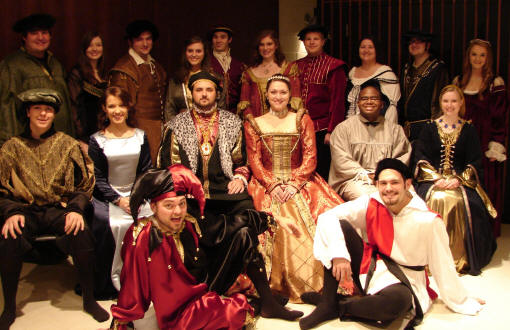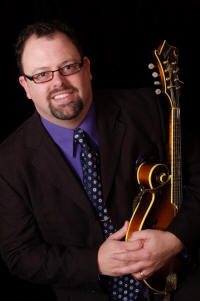|
Eleventh annual Madrigal
Feaste slated for Dec. 2-4
In the style of Merrie Olde England with costumes, decorations, comedy,
and fanfare, the Arkansas State University Choirs will present the
eleventh Madrigal Feaste in the Grand Hall of ASU’s Fowler Center on Thursday, Dec. 2; Friday, Dec. 3; and
Saturday, Dec. 4, at 6:30 p.m.
he Concert Choir and
Chamber Singers, led by Dr. Dale Miller, director of choral
activities, and choral music education professor, Kyle Chandler, will host the
evening’s entertainment. They will serve as the court of “King Henry the
Eighth of England, Jonesboro, and Craighead County.” Guests will enjoy
the Wassail Bowl beginning at 6:15 p.m., and seating will begin with the
first fanfare at 6:30 p.m.

Tickets for Thursday’s and
Saturday’s performances will be available through Monday, Nov. 29, at
the ASU Central Box Office, 972-ASU1, or 888-ASU-FANS. The Friday evening performance will be hosted by the ASU Faculty Women’s Club,
and tickets may be obtained by contacting any FWC member or Madrigal
Feaste chair Libby James
at ext. 3055.
Seats for the Thursday and Saturday performances are reserved and are
limited by space available. Ticket prices are $35 for the general
public, and $30 for ASU faculty, staff, and students, as well as senior
citizens. Proceeds will benefit the ASU Choir concert tour fund to
Carnegie Hall in March 2012. For details, including a list of
personnel, additional photos, music, and the menu, see the
NewsPage release.
ASU SBTDC offers advanced Facebook seminar tonight
The Arkansas
State University Small Business and Technology Development Center (SBTDC) along with the Jonesboro Regional Chamber of
Commerce and Downtown Jonesboro Association will offer a three-hour
“Advanced Facebook Marketing” Seminar Thursday, Nov. 18, from 6-9
p.m. at the ASU Technical Center, 5504 Krueger Drive, Jonesboro.
In this seminar, attendees will explore added tools for Facebook
marketing including how to use Facebook insights to develop marketing
strategies; how to use Facebook community pages to your advantage; how
to use Facebook social plug-ins to link business websites; how to use
tips on time management techniques and tools and how to increase fan
engagement.
Seating is limited to 19 participants. The seminar will be taught by Abbi Siler, a social media consultant from
Local2Social.This is the
final time this seminar will be offered in 2010.
Registration is $40 per person ($30 for Chamber and DJA members and $20
for ASU faculty, staff and students). For more information or to
register, contact the Arkansas State University Small Business and
Technology Development Center at ext. 3517, or by
e-mail,
register online
or visit the ASU SBTDC on Facebook. See
the ASU
Small Business Blog article. See the
NewsPage release.
Bluegrass Monday presents
Kenny Stinson Nov. 22
Kenny
Stinson and Perfect Tym’n will perform a concert of bluegrass
music on Monday, Nov. 22, at 7 p.m. at the Collins Theatre, 120 West
Emerson Street, in downtown Paragould, Arkansas. The concert is part
of the Bluegrass Monday concert series presented by KASU 91.9
FM. Admission is free, but KASU will literally “pass the hat” to
collect money to pay the group. The suggested donation is $5 per
person. Stinson spent 25 years as a sideman, playing in the bands of
bluegrass
 greats
Jimmy Martin, David Davis, and James Monroe, the son of the man who
created bluegrass music, Bill Monroe. After gaining extensive and
valuable experience performing with these great bandleaders, Stinson
chose to form his own group, Perfect Tym’n, which is filled with
experienced, talented traditional bluegrass musicians. The group is
now on tour in support of their debut CD. In addition to the
concert, area bluegrass musicians are invited to come to Terry’s
Café, 201 South Pruett Street (one block east of the Collins
Theatre) beginning at 5 p.m. for an open jam session. Musicians are
asked to bring only acoustic instruments and to play only bluegrass
music. The jam sessions will end promptly at 6:45 p.m. Also, Terry’s
Café will be serving plate dinners beginning at 4:30 p.m. on the
evenings of Bluegrass Monday concerts. Patrons may choose from
all-you-can-eat chili, a four-piece catfish dinner, pot roast or
chef salad, all of which include sides, dessert and a drink.
Concessions will also be available at the Collins Theatre. Bluegrass
Monday concerts are held on the fourth Monday night of each month,
except in December. These concerts are presented with support from
Phillips Funeral Home, Backbeat Music, Main Street Paragould, the
Posey Peddler, the Northeast Arkansas Bluegrass Association and KASU.
KASU 91.9 FM is the 100,000-watt public broadcasting service
of ASU. For details, contact KASU program director
Marty Scarbrough at
ext. 2367. Visit
Bluegrass Monday on Facebook and see
Bluegrass Monday at
MySpace Music. greats
Jimmy Martin, David Davis, and James Monroe, the son of the man who
created bluegrass music, Bill Monroe. After gaining extensive and
valuable experience performing with these great bandleaders, Stinson
chose to form his own group, Perfect Tym’n, which is filled with
experienced, talented traditional bluegrass musicians. The group is
now on tour in support of their debut CD. In addition to the
concert, area bluegrass musicians are invited to come to Terry’s
Café, 201 South Pruett Street (one block east of the Collins
Theatre) beginning at 5 p.m. for an open jam session. Musicians are
asked to bring only acoustic instruments and to play only bluegrass
music. The jam sessions will end promptly at 6:45 p.m. Also, Terry’s
Café will be serving plate dinners beginning at 4:30 p.m. on the
evenings of Bluegrass Monday concerts. Patrons may choose from
all-you-can-eat chili, a four-piece catfish dinner, pot roast or
chef salad, all of which include sides, dessert and a drink.
Concessions will also be available at the Collins Theatre. Bluegrass
Monday concerts are held on the fourth Monday night of each month,
except in December. These concerts are presented with support from
Phillips Funeral Home, Backbeat Music, Main Street Paragould, the
Posey Peddler, the Northeast Arkansas Bluegrass Association and KASU.
KASU 91.9 FM is the 100,000-watt public broadcasting service
of ASU. For details, contact KASU program director
Marty Scarbrough at
ext. 2367. Visit
Bluegrass Monday on Facebook and see
Bluegrass Monday at
MySpace Music.
Dr. Adams, students present
papers at conference
Dr. Anthony Troy Adams, professor and chair, Criminology,
Sociology, and Geography, and three graduate students from the
Department of Criminology, Sociology, and Geography presented papers
at the Association for Applied
and Clinical Sociology annual meeting in St. Louis, Mo., in
October. Dr. Adams conducted a 90-minute workshop, “What are We
Really Teaching Our Students? Using Wagner’s the Global Achievement
Gap to Expand Pedagogy,” on teaching social statistics. Dr. Adams
contends that the way we teach statistical applications using
lectures and canned statistical software, for example, with little
regard for critical thinking, problem solving, and other elements of
social interaction, inhibits learning among millennial students. Wagner’s 7 survival
skills for preparing students for the 21st-century workforce and
Bloom’s revised taxonomy of cognitive learning provide a robust
method for statistics education, but this requires a radically different
approach to teaching. First, students work in teams. Students must
also learn to lead by influence rather than
authority and work cohesively, using critical thinking, including
learning to ask important questions and using problem-solving approaches.
Students learn to defend their decisions, communicate orally and in written form
and have accountability for their end products. Finally, Dr.
Adams maintains that team work, emphasis on written and oral
communication, accountability, and responsiveness may improve
students’ understanding of basic statistical applications. Graduate student Matt Coulter presented
“Gaming and Friendships,” a paper that considered the four leading
theories for friendship formation ((i) Cognitive consistency, (ii)
Developmental, (iii) Exchange and Equity and (iv) Award
association).
Graduate student Brock Hathcock, presented “The Role of Social Movements in Latin America in the Post-Civil War
Era,” an analysis of two distinct ways states attain power--through
both participation in electoral processes and through mass
mobilization.
Graduate student Dominique White presented “Chocolate and Vanilla: From Richard and Mildred Loving to Present
Day, An Analysis of Interracial Relationships in the South," where
she discussed the importance of studying interracial couples and its implications
for race relations.
Back to the top |

